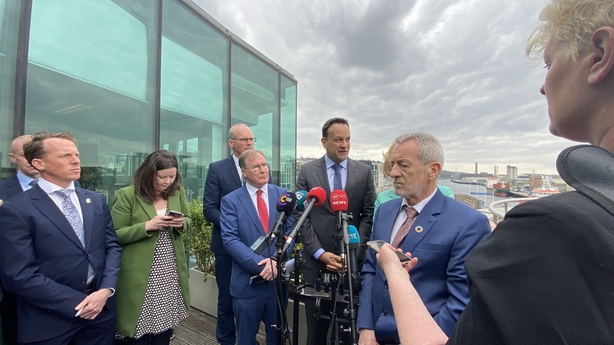Taoiseach Leo Varadkar has said "there are some concerns" about how data gathered by TikTok is used and how it may be transmitted.
Mr Varadkar was speaking in Cork following new guidance issued to Government departments from the National Cyber Security Centre this morning, advising state agencies against the use of the video-sharing app on official devices.
The US and UK governments, as well as EU institutions, recently banned the Chinese-owned platform on staff devices over cybersecurity fears.
Following the bans in other countries the Government said in February that it would seek fresh security advice on the issue, and a technical assessment has now been conducted by the NCSC.
Mr Varadkar said it was important to recognise that the company was "a big investor in Ireland and employs a lot of people" but added that the Government has to "take the advice of cybersecurity experts."

The advice states that TikTok should not be installed or used on official public sector devices, save in exceptional cases where there is a business need - a move which Government says is consistent with the position taken by the European Commission.
Mr Varadkar also added that the move "is something that can be reversed".
In a statement, a TikTok spokesperson said: "We are disappointed by this decision and were not consulted prior to the announcement being made.
"Similar decisions in other countries have been based on fundamental misconceptions and we are always happy to engage with governments and institutions to explain how we protect our TikTok community and their data.
"Our comprehensive plan includes storing European TikTok user data in our local data centres, including two in Ireland; further tightening data access controls; and working with a third-party security company to provide independent oversight of our approach."
"The issue here is not what we know to be happening, the issue is what we can't rule out is happening," Richard Browne, Director of the National Cyber Security Centre has said.
Speaking on RTÉ's News at One, Mr Browne said: "The approach we've taken is precautionary in nature.
"We're not saying that the application can’t be used by other individuals or shouldn’t be used by politicians outside of official devices. The risk here is to public data.
"This is part of a larger international process.
"We found that it [TikTok] does not have any particularly apparent vulnerabilities.
"It does not differ in many ways from many social media applications.
"However, it does have extremely high permissions. It also gathers and stores very large amounts of user data, including sensitive personal data.
"It is on the very high end in terms of the user data that it collects.
"It is also in terms of its ownership structure relatively unusual given that it has a Chinese headquarters. TikTok and its employees are subject to Chinese law.
"The logical argument is that we take a sensible risk-based approach and ensure that Government data can’t be compromised in this way."
TikTok has faced increasing scrutiny over how much access China has to user data, but the company has previously described the banning of its app on Government devices as misguided and based on misconceptions.
In a bid to address data security concerns, TikTok has announced plans to store European user information at two data centres in Dublin, and at a third centre in Norway.
Last month, a US congressional committee grilled TikTok Chief Executive Shou Zi Chew about whether the Chinese government could access user data or influence what Americans see on the app.
TikTok has repeatedly denied that it has ever shared data with the Chinese government and has said the company would not do so if asked.
Earlier this month, the US state of Montana passed a bill that would pave the way for an outright ban of the app in the state by prohibiting mobile app stores from offering TikTok for download to users in Montana.






